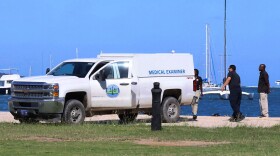ST. CROIX — Active members of the Government Employees’ Retirement System will be able to apply for personal loans by April 30 now that the pension system’s board of trustees unanimously voted during its regular meeting last Thursday to temporarily restart the program with $20 million for the remainder of the calendar year.
GERS has not offered personal loans since August 2015 following the board’s suspension of the program based on its fiduciary responsibility to the System, which was projected to run out of assets this year if nothing was done to inject cash into the System.
The 34th Legislature, however, approved a Public Finance Authority bond restructuring bill supported by rum revenues in the first quarter of 2022 that brought solvency to the pension system by providing between $82 million to $158 million in annual contributions that will total about $4 billion over 30 years.
The GERS board voted 5-0, with one member absent, during last week’s meeting to authorize the restart of a limited loan program now that the System’s liquidity has improved. The board’s authorization for the program will expire on December 31.

“We do feel that we’re at a point now where, with somewhat improved liquidity and proper security for the loans, that we can proceed with a limited restart of the program,” GERS Administrator Angel Dawson Jr. said Wednesday.
Dwane Callwood, GERS board chair, said during the meeting that board members will look at where the System is financially during its meeting in October to determine whether it will extend the program for another year.
“We’ll just look at the numbers and see if it’s still viable, or makes sense for us to continue the program in 2025, and each year we will do the authorization for the following year, so it’s not that we’re gonna restart it now and it’s going to run forever and ever,” he said. “We’ll run it as long as the numbers make sense, and it’s something that we’ll reevaluate on an annual basis.”
The $20 million shall be allocated and disbursed evenly between both island districts during the authorized period, with $10 million for St. Croix and $10 million for the St. Thomas-St. John District. The maximum amount allowable at an 8% interest rate to be repaid within five years for applicants who have contributed at least two years shall be the lesser of $10,000 or 75% of their contribution credit in the System.
Although the limited loan program is only available to active members, board members support extending it to include retirees. Doing so, however, would require an amendment to the law. Legislation enacted in 2016 following the board’s suspension of the program the previous year requires GERS to issue personal loans to its active members.
Ronald Russell, a GERS board member, suggested during the meeting that the board should request an amendment from Senator Kenneth Gittens, who proposed the 2016 legislation (Act No. 7880) along with then-Senator Kurt Vialet. Rather than modifying the resolution the board approved that authorized the restart of the limited loan program to include retirees as Russell suggested, the board chair was adamant about approving the resolution as is to get the program started by April 30.
“We could revisit all these other options and potential changes down the road,” Callwood said.
Russell maintained his advocacy to include retirees in the loan program.
“I support the resolution, but I think the retirees not having access is a problem, and we’ve got to address it at some time,” he said.
Callwood confirmed on Wednesday that he has no objection to including retirees in the program.
“The matter was discussed prior to the Thursday meeting, and it was already agreed upon that that was something we would pursue after the restart of the program,” he said.
Gittens is also on board with amending the law so retirees can apply for loans.
“I’m not opposed to that at all,” he said. “I would support something like that.”
Senator Milton Potter has pending legislation, Bill No. 35-0196, relating to the loan program. He, too, said he would welcome an amendment to include retirees in the program.

“I would be amenable to it if I can get the GERS to say that they are in line with that, they’re comfortable, they think that finances could permit it,” he said. “I would have no problem with that.”
Russell stressed that retirees who apply for a loan would need to have proper collateral.
“They’ve contributed and they should receive the benefit of a loan program,” he said Thursday. “The only issue is the collateral, and we believe that if a retiree could provide enough collateral, or security for the loan, they should get a loan.”
Potter’s bill would require the GERS board to resume the personal loan program by September 30, and strike the 8% interest rate and empower the board to establish it. Now that the board has authorized to restart the loan program by April 30, the senator said the deadline date in his measure becomes moot. He spoke of the significance of removing the 8% interest rate.
“It’s not necessarily saying that they are going to put the interest rate higher, but it could be lower,” he said. “It could be higher, but whatever is in the best interest of the System based on real-time conditions, so we just thought that that was a wise thing to do to give the GERS some flexibility, and to operate in accordance to what is in the best interest of the members and to the survival of the System.”
Callwood, who provided insight as Potter drafted his measure, said the board supports removing the 8% interest rate that is set in statute to give the board flexibility to be able to manage the loan program in real time so that being locked into an 8% interest rate would not “price us out of the market.”
“We just didn’t want to be in a box and bound to 8% if the 8% was going to put us in a position where we were noncompetitive in terms of being able to start the loan program,” he said by phone.
Potter’s bill seeks to remove the $10 million annual aggregate amount per island district.
“GERS concurred that they were in a position to lend beyond that,” he said.
Potter’s bill would also require that all loans be structured so the payoff date occurs before the retiree reaches the age of 70, and limit the System’s liability to $75,000. He said the bill will be heard in the Committee on Budget, Appropriations and Finance. He said it might be too soon to introduce it during next week’s committee meeting, but he expects to introduce it during the subsequent meeting.
The System offered personal loans to both active members and retirees prior to the program’s suspension in 2015.
“I joined as administrator in July of last year, but it is my understanding that at one point prior to suspension of the program, that there were in fact loans made to retirees as well as active employees of course,” Dawson said, noting loans that active employees received may have also transferred to the System’s retiree portfolio after those individuals retired.
As of December 31, 2023, GERS had 719 personal loans, including 317 loans made to active employees and 402 to retirees, as well as one auto loan and 71 mortgages (including 20 construction home improvement mortgages, 23 land loans, and 28 purchase refinance loans), according to Dawson. He said the total loan amount comprising all categories was $7,656,866.49 at that time.
Callwood noted that active members have utilized the loan program for home improvement, medical issues, and vacation.
“It definitely is one of the favorite benefits of being a part of the System, so it was something that I was always interested in seeing being brought back to life,” he said Wednesday. “I wasn’t on the board when it was suspended, but I understand the reasoning behind the suspension of the program.”
The GERS board was planning to restart the personal loan program prior to Potter’s bill calling for the resumption of the program by September 30. Callwood said the board’s action to restart the program did not have anything to do with the senator’s pending legislation.
“We actually had agreed from our last annual board retreat, which was July of 2023,” he said by phone. “We discussed the loan program and we had already agreed that we would try to get it started sometime early in 2024.”
Nellon Bowry, a GERS board member, asked during last week’s meeting if there was any basis under which the board has discretion in whether to implement the loan program given that the 2016 law mandated the restart of the program. Pedro Williams, the board’s legal counsel, said the board did not immediately restart the program following enactment of the 2016 law because of its fiduciary duty.
“The board has exercised that discretion not to do it because the numbers didn’t support restarting the loan program,” Williams said.
Potter agreed the GERS board must follow its own policies.
“It also gives them a fiduciary responsibility to act in accordance of what is in the best interest of the survival of the System, which in my view would trump, perhaps, reckless legislation that could be passed theoretically that puts the System in a position where we’re putting a burden and a strain on the System, which impacts potentially the survival of the System,” he said.
Gittens stressed that the lawmaking body needs to be updated when the GERS board makes such decisions.
“It’s good to know that they’re finally starting to adhere to the law, but they don’t determine how long it continues, unless of course there’s no money, then of course they’ll come back to the Legislature and let us know that there’s no money to continue the program, so I’ll have to take a look at that as time goes by,” he said.















